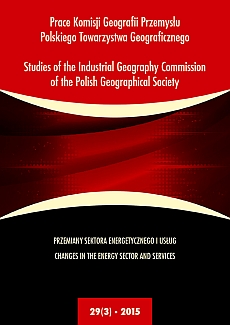Conversions in management of waste economy in Poland in the light of changes of act on the maintenance of clearness of wastes and order in municipalities
DOI:
https://doi.org/10.24917/20801653.293.10Keywords:
level of social acceptableness, pro-environmental investments, waste economyAbstract
The aim of the article is to estimate the capability of sponsorship by the Polish society ofthe waste economy transformation, shown inter alia in next amendments to an act on the maintenanceof clearness of wastes and order in municipalities, in direction indicated by the European Union. Ithas emerged as a result of research of common authors about capability of installation maximal and municipal costs. Research was based on analysis of statistic data, interviews carried in municipalitiesand results of questionnaires.After the GUS analysis and the results of the author’s own study it turns out, that:1. Amendments the act on the maintenance of clearness economy wastes and order in municipalitiesuntil now did not result in a decrease of environment pollution.2. Some waste enterprises, which have won bids, at it seems store away partly in forests or ditches orpits, in this way lowering operative costs.3. Polish society as from GUS data result can theoretically pay more for municipal services, includingthe receipt of waste comparing to this moment and this fact can increase the level of chargeon the one hand but on the other hand can let to financing more expensive but pro-environmentalregional installations for processing municipal waste.4. Pro-environmental regional installations for processing municipal waste let to decrease the currentfines for not keeping environmental union obligations, and will allow avoiding additionalfines in the future1.5. Pro-environmental investments can prompt local and regional economic situation by adding newwork-places. Scale and size of this process depends on engagement of local and regional investorsto these investments.Downloads
Metrics
References
Dyrektywa Parlamentu Europejskiego i Rady 2008/98/WE z dnia 19 listopada 2008 r. w sprawie odpadów oraz uchylająca niektóre dyrektywy (Dz.U. UE L z 22 listopada 2008 r.).
Górnicki, E. (2014). Wpływ stawki opłaty za zagospodarowanie odpadów komunalnych na budżet gminy. Studia i Prace Kolegium Zarządzania i Finansów, 138. Warszawa: Oficyna Wydawnicza Szkoły Głównej Handlowej.
Grzymała, Z., Goleń, M, Hossa, P. (2014). Wytyczne dotyczące ustalania maksymalnych i minimalnych stawek opłat za gospodarowanie odpadami komunalnymi z analizą kosztów gospodarki odpadami komunalnym ponoszonych przez gminę. Projekt współfinansowany przez Unię Europejską w ramach PO Pomoc techniczna 2007–2013, Warszawa.
Infrastruktura komunalna w 2013 roku (2014). Warszawa: GUS.
Maśloch, G. (2014). Gospodarowanie odpadami komunalnymi w aspekcie wyzwań wynikających z realizacji koncepcji zrównoważonego rozwoju (wybrane problemy). Studia i Prace Kolegium Zarządzania i Finansów, 138. Warszawa: Oficyna Wydawnicza Szkoły Głównej Handlowej.
Rozporządzenie Ministra Środowiska z 29 maja 2012 r. w sprawie poziomów recyklingu, przygotowania do ponownego użycia i odzysku innymi metodami niektórych frakcji odpadów komunalnych (Dz.U. z 2012 r. poz. 645).
Sytuacja gospodarstw domowych w 2013 roku w świetle wyników badania budżetów gospodarstw domowych (2014). Warszawa: GUS, Departament Badań Społecznych i Warunków Życia.
Ustawa z 13 września 1996 r. o utrzymaniu czystości i porządku w gminach (Dz.U. z 2005 r. nr 236, poz. 2008 z późn. zm.).
Downloads
Published
How to Cite
Issue
Section
License
Articles are published under the terms of the Creative Commons License (CC BY-ND 4.0; Attribution– NoDerivs).

